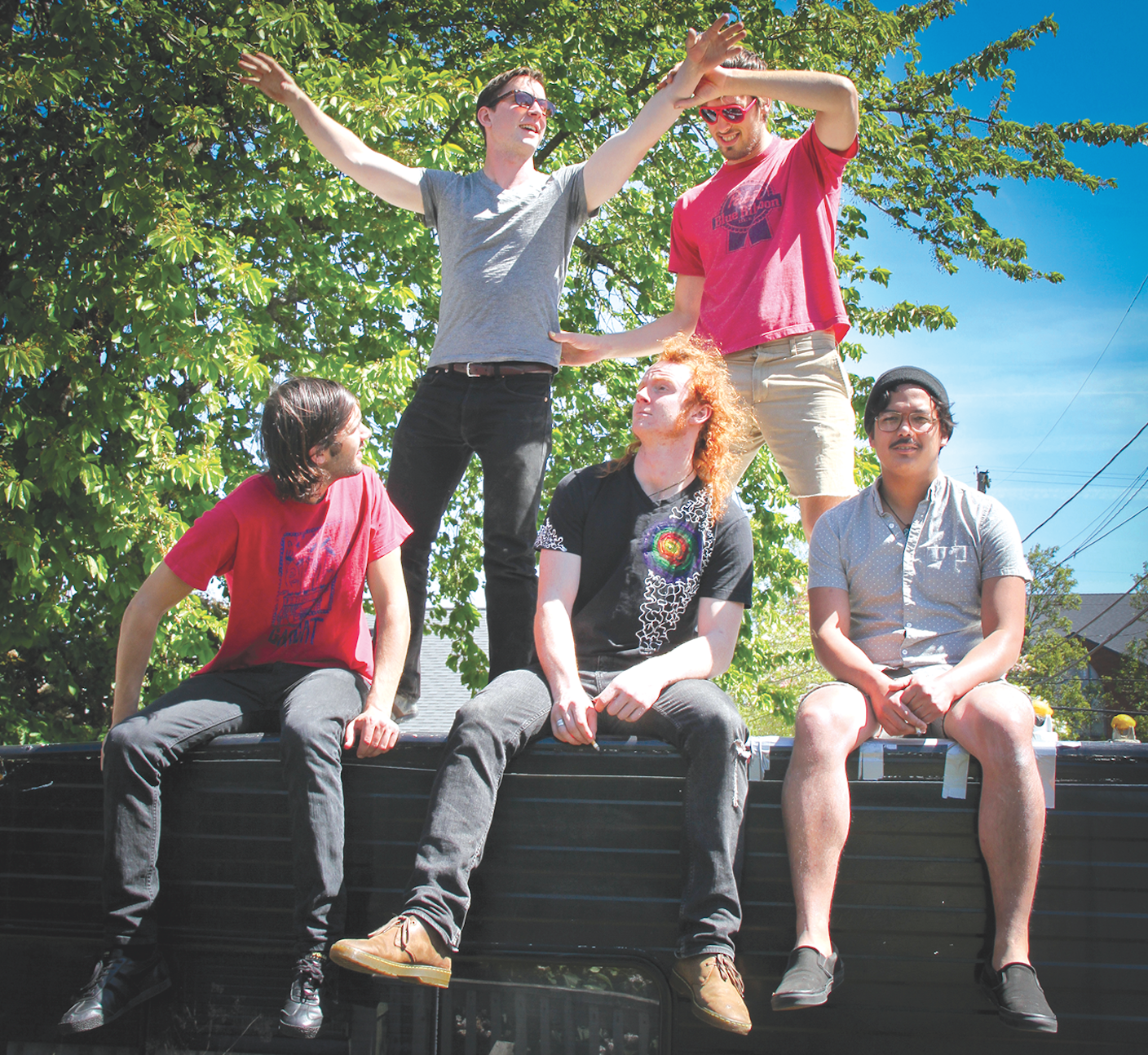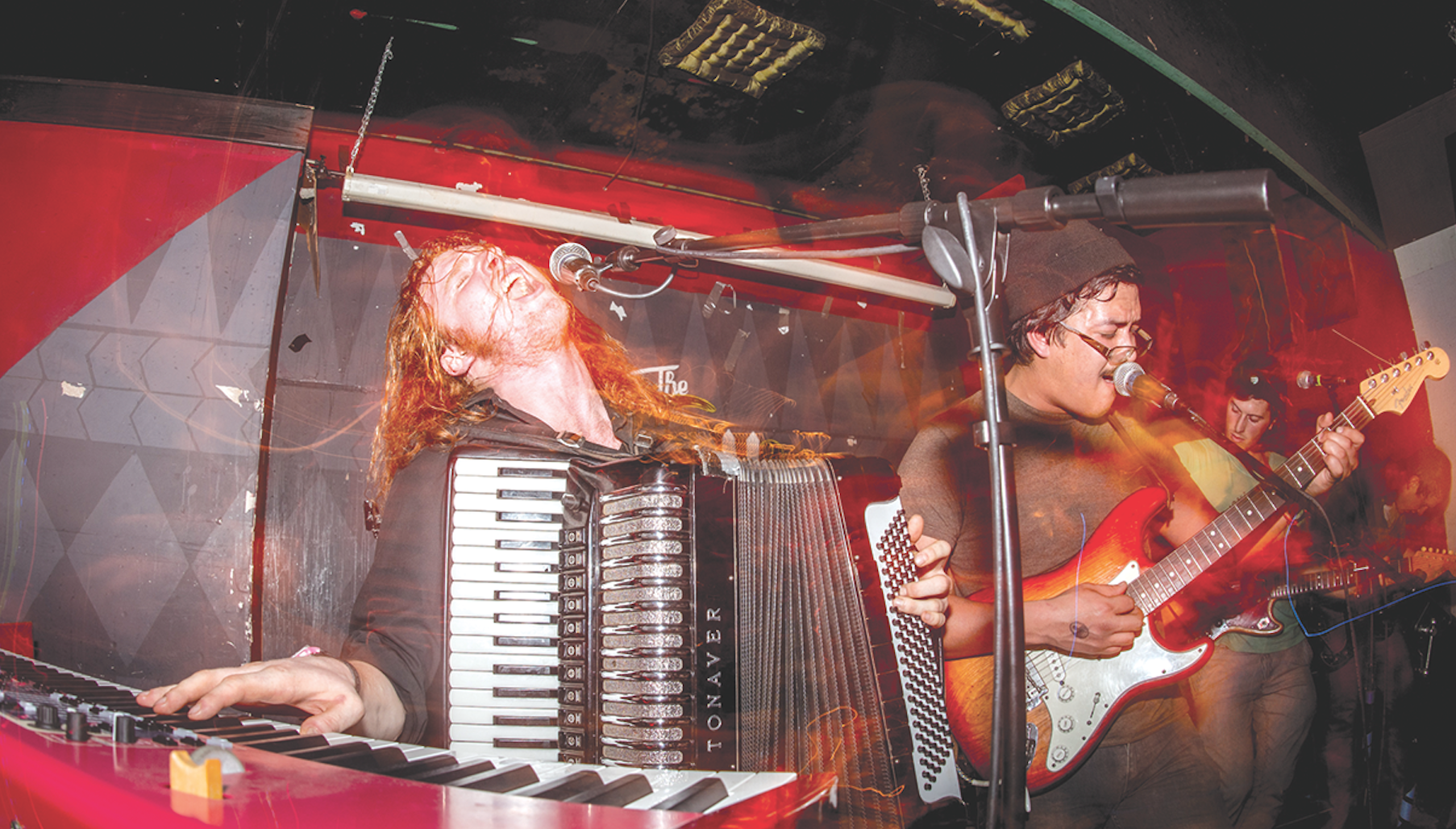Animal Eyes


There lies in music a precious gift serving human understanding, a looking glass. Animal Eyes has so many tints and lens’ hues that when they bring them all to bear, the viewer feels awash and dazzled. Their latest album, Where We Go, is of the many shades of life; at least regarding their friends, lovers and family there have been few emotions with which it has not been closely colored. Its complexity mirrors ours. The album turns out to be a personal and multi-voiced diary, and the listener learns from the entries that Animal Eyes have something to share, a vision, that they are storytellers, that they have struggled through their memories to bring us now some portraits of the human experience and that the world’s face is a kaleidoscope.
Eleven: What was like growing up playing music in Alaska?
Haven Multz Matthews: Definitely very limited. Homer [Alaska], for instance, was a great place for playing music and being a young kid because there was so much community support, but it was still very limited as far as seeing live bands and going to shows.
Tyler Langham: Yeah that wasn’t a part of our experience at all growing up. You didn’t see live music other than a dad bar band.
HMM: We had to make the live music happen.
Sam Tenhoff: It was kinda like being on a deserted island, and being like “we’re gonna do what we see other rock bands do in movies” but with no influence from any other bigger bands coming through town. Just kind of making it up. Totally DIY.
HMM: The biggest show I ever saw growing up was Bela Fleck and the Flecktones at the high school auditorium when I was 18. That was the big whoop-di-doo. I remember my mom bought me tickets to see Blink-182 in Anchorage and then they canceled.
TL: Anchorage, which would be a four-hour drive to see a rock band.
Colin McArthur: But it was great. I’d come into town and hang out at Sam’s loft and play bass for a few hours and then we’d have a band practice somewhere. We organized a lot of shows. It was really insulated in that respect, it was just us playing with all the other kid bands in town.
TL: It was fun growing up in Alaska because we were at a stage in music experience where jamming was still really fun and we did it all the time. Just get stoned and jam. It didn’t matter what we were jamming on or with, or whether we knew what we were doing, but that really hooked me to music, the amount of silly jamming I did as a 15-year-old kid.
CM: It felt like it had a lot of meaning to stay up late and play music for hours in Haven’s basement.
TL: This feels important. “I will not try to go hang out with a girl because I’m jamming.”
11: The album is diverse; it’s not like you’re using one song format and switching up the lyrics or the melody. There’s different instrumentation, polyrhythm, and weird time signatures like on “Mushroom Hunter.” It’s complex. Do you worry sometimes that complexity might scare away fans looking for easy digestion?
HMM: Maybe with the singing and the vibe of the songs it’s pretty different, but I’m not worried about the instrumentation scaring people away. I don’t think it’s too out there. It’s what we like to do, and it’s what we want to do. I think we still make it pretty pop sensible.
TL: I love pop music, I love catchy hooks, I feel like that’s a part of good songwriting. I don’t really listen to noise music; most of the stuff I listen to I enjoy for the song craft. Keeping it still a song in itself so that if you strip everything away and there’s just a guitar player and a singer it could still be played around a campfire and be a song. So I guess we’re somewhat rooted in folk in that aspect. I feel like the toughest thing is not necessarily the fan base but a lot of the people who want to review it, or industry looking at what we’re doing and discarding us, just because it’s not as cohesive.
ST: Also, I feel like it’s less with the band than this particular album. It’s kind of the theme: the places we go and the places we’ve been in our heads with our emotions and our relationships. The songs are just a collection of our experiences that we’ve had over the years that have moved us to the point of wanting to make a song about it, as opposed to sitting down and writing a whole batch of songs together.
TL: I always look at it like a series of journal entries.
11: You have three different songwriters, and each one of you sings lead on different tracks. But sometimes you guys have this trio of lead vocal parts on the same song, like “Alligator Sex,” where there are a couple different vocal parts, but towards the end of the song all those parts start to collapse in on top of each other and it’s totally unclear who’s the lead singer in the song. It reminds me of Menomena, who had three primary songwriters, but it’s uncommon. What drew you to that?
HMM: Coming from my perspective I don’t think any of them want to be the lead singer or lead songwriter, so they kind of fleece each other into writing songs.
TL: Fleece? [laughing] Definitely no one wants to be the lead singer. I think growing up listening to so much Menomena, and also Figley and I and Sam have been making music off and on since we were in eighth grade in a very communal writing fashion so it was just natural for us to do.
ST: We’ve been writing together for so long, it’s hard for any of us to think of it as lead singing. Before I started singing I was still helping Tyler write lyrics and melodies, I was still a part of the writing process.
TL: A lot of times those communal singing ones are also written based around a drumbeat. Haven will map out a full structure on the drums, the verse beat, the chorus beat, the bridge beat and this is how they all interact with each other. Because the other times one of us will just write a song in our bedroom and then take it to each other and say “hey what do you guys think?” But the other kind of way that Animal Eyes writes music is when Haven brings a drumbeat to the table and then we’re all in the jam room.
ST: I feel like those songs are the most Animal Eyes of songs, like “Alligator Sex” or “Mushroom Hunter.” It’s like we actually made it while we were playing music and jamming. But we’re not a jam band!
11: How do you feel about the genre title art-pop or art-rock being attached to you?
ST: I think art-pop is a good way to put it, because when we write a song it’s not like we’re following a formula, it’s like each song is its own portrait, and it kinda has its own story and own life that we give it.
TL: But I feel art-pop is a little misleading. We were kind of labeled as art-pop when we released Found in the Forest because there were a lot of ambient sounds, like interludes in the album with people running through the woods in the forest, and that was more like you’re doing art with music, but I think now it’s more just experimental pop. Because that’s one thing we like to do, is keep it poppy but try to get as fucked with it as we can. I want to confuse people but then make them think, “Oh I can’t help to sing along,” or “I don’t know why I’m dancing to this beat because it doesn’t make sense, but it makes my knees bend and it feels good …” I guess that for me is a fundamentally Animal Eyes position towards our songwriting.
11: You guys have all been super close friends most of your lives growing up together. How does being really tight with your bandmates make it hard or easy?
HMM: I’d say it’s somewhere in the middle. You know they say being in a band is like having a bunch of girlfriends. It’s like a real serious intimate relationship.
TL: We also don’t have a lot of boundaries with each other because we’ve all been friends for 15 years, so I feel like that can also make it difficult sometimes, because with other people you haven’t known forever there are boundaries there you don’t cross. And with us we are so comfortable … it’s like family, you fight with your brothers the most, and you love your brothers the most. So it’s awesome, we get along really good and then have awesome fucking violent blowouts and it always feels better afterwards.
ST: I feel like we graduated from girlfriend level and now we’re straight married. Because as hard as we fight, all of us know that we’re not gonna get a divorce because that would suck so fucking bad. That would be the worst thing in the whole world, as opposed to the lighter situation where you can just break up.

TL: We can really abuse each other and continue.
11: What bands in Portland do you really love right now that you want to give a shout out to?
HMM: I really like this band Wishyunu, they’re a cool two-piece.
Figley: Fog Father. For sure. But there’s a big list.
TL: A super new band called Each Both is popping up on the scene.
ST: Sama Dams is one of the best Portland bands, along with Chanti Darling and Yeah Great Fine. »
– Ethan Martin
*Animal Eyes celebrates the release of Where We Go on May 12 at Mississippi Studios.




